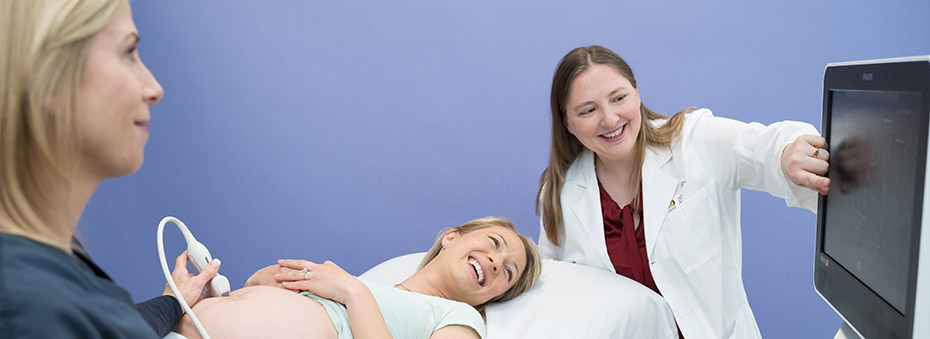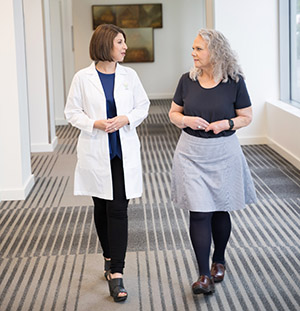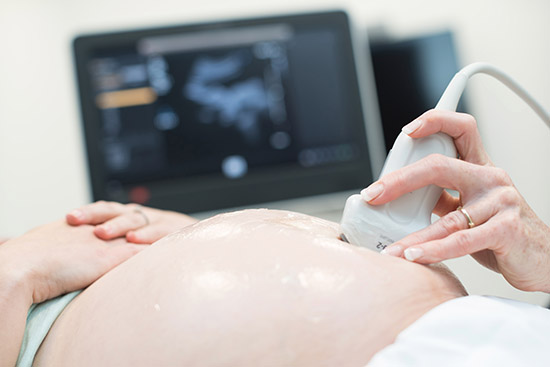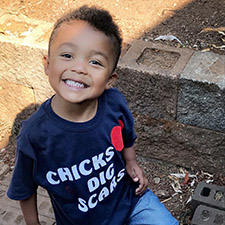Fetal Heart Care

OHSU Doernbecher is the only hospital in Oregon and southwest Washington with comprehensive pregnancy and fetal heart care in one place. We will care for you and your baby at every step: as your baby develops, right after birth, and as your child grows.
You’ll find:
- Top prenatal and children’s heart specialists working together.
- Consultation with fetal heart experts within days of a referral.
- Advanced imaging such as fetal echocardiogram and MRI when needed, for better planning and early treatment.
- A dedicated team that tracks babies with heart conditions from diagnosis in the womb through the baby’s first birthday.
- Neonatology (newborn care) services ranked among the nation’s best.
- Consultation with surgeons, if needed, to repair a congenital defect.
What makes our program different
- We have the largest team of experts in high-risk pregnancies and fetal heart conditions between Seattle and San Francisco.
- Our fetal heart doctors see more than 1,000 pregnant women a year for screening, diagnosis and treatment.
- Our fetal heart care team is part of Doernbecher’s Fetal Care Program, offering care for many types of fetal conditions.
- If your baby has a heart condition, our Fetal Link team will provide care and support from your baby’s first fetal heart scan through your baby’s first year of life. Learn more about Fetal Link, the only program of its kind in Oregon, on our programs and services page.
- You’ll find exceptional expertise in all types of scans, with both doctors and technicians trained to do fetal echocardiograms. Hospitals and offices throughout the region send echocardiograms to our specialists for review.
Conditions we treat
Fetal heart care is important because, for many conditions, outcomes are better when diagnosed before birth. Conditions we treat include:
- Congenital heart defects (problems with the heart’s structure), including valve and blood vessel disorders.
- Irregular, fast or slow heart rhythms (arrhythmias).
- Hypoplastic left heart syndrome and other single ventricle defects.
- Heart conditions caused by genetic syndromes, such as Trisomy 21 and 22q.11.2 deletion syndrome.
- Twin-twin transfusion syndrome (unequal blood flow to twins sharing one placenta) and other fetal conditions that affect the heart.
What to expect
Team-based care: Our fetal heart doctors work with your prenatal team and specialists throughout OHSU to create the best care plan for you and your baby. The team meets once a week to talk in detail and adjust the plan.
Your care team may include:

- Maternal-fetal medicine doctors (perinatologists) who specialize in high-risk pregnancies.
- Fetal cardiologists with expertise in imaging.
- Children’s heart surgeons and heart catheterization doctors for procedures after birth.
- Anesthesiologists with expertise in high-risk pregnancies and care for infants with heart conditions.
- Neonatal doctors (neonatologists) and nurses to provide intensive care for your newborn.
- A nurse coordinator to help with scheduling, tests and treatments.
Coordinated care
It can be stressful to hear that your developing baby might have a heart condition, then wait for answers. That’s why we:
- Schedule your first consultation with a fetal heart expert within days of a referral.
- Coordinate your tests, scans and visits on the same day and in the same place.
- Give you fast results from our on-site labs.
- Talk with you about your baby’s diagnosis and care plan the same day tests are done.
- Offer palliative care specialists who provide a range of services, including support for difficult decisions.
Convenient locations: You can see us at Doernbecher in Portland and throughout the region, including in Salem, Eugene, Medford, The Dalles and Vancouver. We’ll work with your regular doctors and help them plan for delivery in your hometown.

Diagnosing fetal heart conditions
Early prenatal diagnosis can help you know what to expect so you can make the right decisions for your family. We offer advanced imaging and testing to assess your baby’s heart.
Fetal echocardiogram
This is a type of ultrasound we use to look closely at your baby’s heart. We use a wand pressed to the mom’s belly. Our fetal heart doctors, as well as technicians, are trained to do these scans so they can fine-tune images for a more accurate diagnosis. During or right after the scan, the doctor will talk with you about:
- Your results
- Family history
- Risk factors
- Care options
Fetal MRI (magnetic resonance imaging)
This test uses radio waves and a strong magnet to show a different view of your baby’s moving heart. Your doctor may recommend an MRI to check your baby’s heart, kidneys, liver and other organs.
Genetic tests and counseling
Genetic tests can show whether your baby has a chromosomal abnormality or an inherited condition that might affect the heart. A certified genetic counselor will help you understand your results, discuss your options, and support your decisions.

Treatment before birth
Delivery planning can help determine the best time and place to deliver your baby. Most congenital heart defects are best treated after the baby is born. We can help you deliver your baby safely and provide immediate care to your newborn. We will be at your bedside with any treatment your baby may need right away.
Medication can sometimes help your baby’s heart work better or beat at the right pace before birth.
Fetal heart surgery or catheterization is rarely needed, and offered at only a few centers in the country. If we think prenatal surgery might help, we can refer you to a national center with this service.
Treatment after delivery
Your baby’s care plan may include:
Imaging
We will do scans of your baby’s heart using echocardiogram, MRI and/or CT to refine your baby’s diagnosis and to plan treatment.
Prostaglandin
This medication can be lifesaving for babies born with certain heart defects. Prostaglandin keeps the connection between two essential blood vessels open, allowing blood to flow to all parts of the body.
The opening, which normally closes after birth, needs to stay open in some babies until other structural problems can be corrected with surgery or catheterization. Prostaglandin is given to your baby through an IV right after delivery. Most community hospitals don’t have it.
Intensive care
Our Neonatal Intensive Care Unit (NICU) provides top-notch care to premature and seriously ill newborns. Our services include heart and lung support, close monitoring and incubators. You can tour the NICU before your baby is born to know what to expect.
Doernbecher’s NICU is the only one on the West Coast with a gold Beacon Award for Excellence from the American Association of Critical-Care Nurses. This award recognizes our excellent patient care and outcomes.
Heart catheterization
Catheter procedures are a safe way for our heart team to diagnose and treat complex conditions.
While your baby is asleep (under anesthesia), our catheterization experts insert a thin, flexible tube into a blood vessel and guide it to your baby’s heart. Through the tube, our team can close or enlarge blood vessels, fix heart rhythm problems, or repair defects in even the smallest babies.
Heart surgery
Our children’s heart surgery team is available 24/7 to repair complex heart defects in newborns. Our surgeons will meet with you as part of your prenatal team before your baby is born to plan any surgery.
For families
Call 503-346-0640 to:
- Request an appointment.
- Seek a second opinion.
- Ask questions.
Locations
Parking is free for patients and their visitors.
Doernbecher Children’s Hospital
700 S.W. Campus Drive
Portland, OR 97239
Map and directions
Find other locations across Oregon and in southwest Washington.
Refer a patient
- Refer your patient to OHSU Doernbecher.
- Call 503-346-0644 to seek provider-to-provider advice.
‘As prepared as possible’

Learn how prenatal diagnosis and early treatment of a heart defect made all the difference for Jacob Anderson V and his parents.